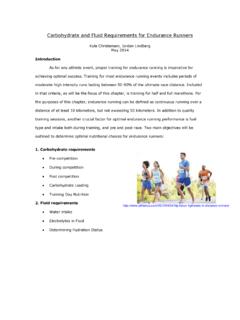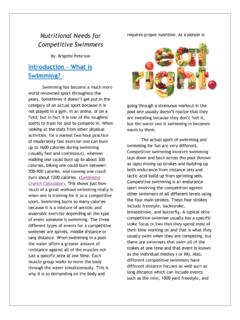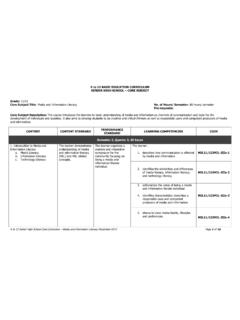Transcription of Effects of Carbohydrate Loading on High Performance …
1 C Ali Mueller, Amelia Reek, Josh Schantzen Carbohydrate Rich Foods Slice of bread 15g Piece of lasagna 19g Apple 25g Banana 27g Cup of oatmeal 30g English muffin 30g Slice of pizza 36g Bagel 48g Large baked potato 60g Carbohydrate Loading is a dietary practice used by elite athletes use in order to aid in event Performance by supplying adequate energy sources through skeletal muscle glycogen content. Carbohydrate Loading is a type of diet where foods high in carbohydrates are eaten a few days prior to or right before an event; this is believed to help aid and provide energy during long-term endurance events. Carbohydrates are a main fuel source for the body; Loading up on carbohydrates is believed to help store large amounts of energy and is used to help replenish and load muscle glycogen content.
2 It is common for professional athletes as well as novists to Carbohydrate load the day or a few days prior to an athletic event. Muscle glycogen is the main fuel muscles use in order to perform work on a day-to-day basis. Carbohydrates are broken down by the body and turned into glycogen; which is stored in muscles. Carbohydrate Loading is believed to place high amounts of glycogen into muscles in turn aiding in physical Performance and long-term endurance. Effects of Carbohydrate Loading on high Performance Athletics Spotlight on Carbohydrate Loading from a Sports Professional 2 Lorem Ipsum Dolor Spring 2016 Research has shown that Carbohydrate Loading helps to raise muscle glycogen content.
3 It is believed that Carbohydrate Loading the day or night prior to a long endurance will provide adequate and extra energy to muscles. Although Carbohydrate Loading is popular practice; many are unaware of the process and benefits. Carbohydrates are a main fuel source of the body and help in overall muscle use. Glycogen is the main energy source used by muscles and provides energy during exercise and physical activity. A vast number of studies have been conducted on Carbohydrate Loading ; through this research it has been confirmed that when done properly, Carbohydrate Loading does work. Carbohydrate Loading used to increase or elevate muscle glycogen content higher than normally has been shown to increases energy during endurance events.
4 A study conducted in 1996 by Akermark, C et all; examined Swedish hockey players; the players were randomly split into two groups. The athletes were either given a high Carbohydrate diet or a regular mixed foods diet. The players who consumed the Carbohydrate rich diet showed improvement in overall speed, distance, and time skating compared to that of the players on a regular diet. In another study done to test the effect of Carbohydrate Loading ; mountain bike participants were randomly selected into groups where one group was given a high Carbohydrate diet before a given race and the other a low Carbohydrate diet. The high Carbohydrate diet consisted of 3 grams of Carbohydrate per kilogram of body weight while the low Carbohydrate diet consisted of 1 Carbohydrate per kilogram of body weight.
5 The researchers found that initially the competitors consuming the lower Carbohydrate diet Performance appeared to have more energy in the first lap around the course but by lap four the high Carbohydrate diet racers were ahead. They found that the high Carbohydrate diet racers had a 3% increase in Performance compared to the lower Carbohydrate diet racers. A 3% increase may not be significant in short-term races or sprint races, however in endurance or longer lapped races it may help increase in Performance and overall energy. In most studies muscle biopsies were preformed on the participants before and after their experiment and sometimes even during the trial. 3 Lorem Ipsum Dolor Spring 2016 Although some studies showed no increase in overall Performance ; most of these biopsies showed and increase in muscle glycogen content after the experiment was conducted.
6 A third study conducted by Hatfield, et all; examined the Effects of Carbohydrate Loading on repetitive jump squat Performance . Researchers found no increase in Performance level when eight healthy men were given a high Carbohydrate diet and a low Carbohydrate diet prior to performing the test. Other outliers or factors can affect ones physical Performance , these include already having adequate glycogen content, overall physical Performance ability (such as being physically trained or untrained) and overall health. The third study did not specify if the eight men have been conditioned or are regularly physically active. Also mental factors can inhibit or increase Performance aside from muscle glycogen content.
7 If one believes they are going to perform better and or worse after increasing Carbohydrate intake, there is a possibility that it may skew the data. Showing an increase muscle glycogen content after Carbohydrate Loading helps to determine that carbohydrates will aid in the recovery and replenishment of muscle glycogen content after a high intensity athletic event. Carbohydrates and Carbohydrate Loading : According to Webster s Dictionary, the definition of a Carbohydrate is, any of a large group of organic compounds occurring in foods and living tissues and including sugars, starch, and cellulose. They contain hydrogen and oxygen in the same ratio as water (2:1) and typically can be broken down to release energy in the animal body.
8 More specifically, Carbohydrate Loading or sometimes referred to as carb- Loading or carbo- Loading can be defined by Webster s dictionary as, a strategy used by endurance athletes, such as marathon runners, to maximize the storage of glycogen (or energy) in the muscles . Most high endurance athletes use Carbohydrate Loading as a nutrition regimen a few days prior to the event; because Carbohydrate Loading is known to produce an increase in stored muscle glycogen; which is known to prolong exercise, along with improve long-term Performance . Although this theory has been researched extensively, the gender difference does make an impact on the muscle glycogen storage in men and women. Over time, men seem to increase their muscle glycogen storage much higher than women, whereas women increase their muscle glycogen about 13% when eating a high CHO diet for six days or more (Chen, 2008).
9 4 Lorem Ipsum Dolor Spring 2016 Carbohydrate Loading Effects on long distance Endurance Exercise: When gearing up to run a marathon ( miles) a runner s number one goals is to stay energized as long as possible, along with prolonging fatigue as long as possible. Carbohydrate Loading before a race along with intermittent intake of carbohydrates between training runs has been shown to promote restoration of muscle glycogen during the endurance run along with help the runner to train harder, and recover optimally after long runs (Burke, 2007). Of course with any exercise regimen, the exercise intensity and duration plays a key role in the carbohydrates that are used during that exercise. With Carbohydrate Loading , in order to get the most optimal amount of stored muscle glycogen, the runs should be moderate intensity lasting ninety minutes or more.
10 This is also the optimal intensity and duration to prolong muscle fatigue by about twenty percent (Hawley 2012). For similarity and balance with training to the race, it is most beneficial to eat 7-10grams of Carbohydrate per kilogram body weight the night before the race and long distance training runs. As well as proper hydration and replenishment of electrolytes, it is also recommended to eat about 55% of the diet Carbohydrate , and the night before race day it is recommended to eat about 70% of the diet carbohydrates. The shown above is an example of a normal Carbohydrate loaded meal, which a healthy college age male might choose to eat before a high endurance athletic event. 5 Lorem Ipsum Dolor Spring 2016 Interview with a Marathon Runner Leah Mueller, who has experience running multiple full marathons, was recently interviewed regarding running and Carbohydrate intake.






